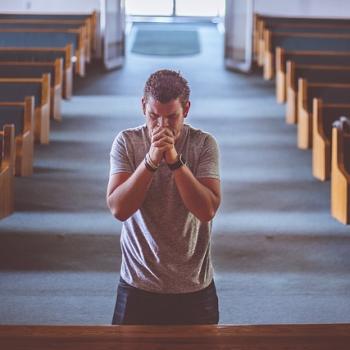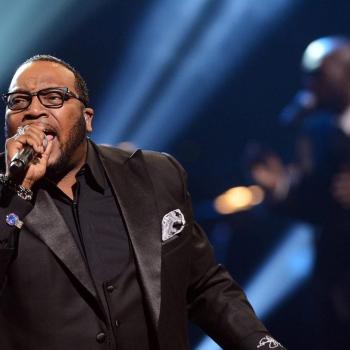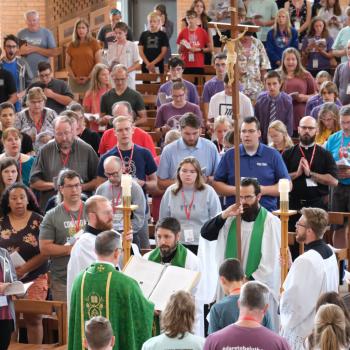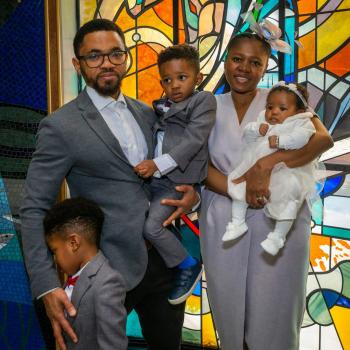“Are you still an ordained minister?” my friend asked me. I hesitated. “Well, that’s a long story. Because Baptists make it complicated.”

“My short answer is yes,” I told her. “I’m still ordained as a Southern Baptist minister. Although, if I had been ordained in nearly any other denomination, I’d have to say that I was ‘former clergy.’ But, because of the Southern Baptist structure, I’m ordained for life—unless the church that ordains me decides to revoke my ordination. There are pros and cons to that sort of polity.
This month marks thirty years of ordained Christian ministry. The effectiveness of my vocation is measured more in lives touched than in parchments on the wall. Still, after thirty years, I’m ready to critique the system that made me.
Ministers Need a Call Story
For those entering Christian ministry, it’s good to have a “call story.” On my first day of seminary, we went around the room as each new student told his or her account of how God led them to a place of considering vocational ministry. Some told tedious tales of how they were born into ministry families and how church work seemed like the natural choice. The family business, you might say. Others gave romantic reports of how God wooed them like a lover and invited them into ministry. Still others detailed dramatic conversions and even more striking stories of how God drafted them into service. Each had their tale to tell. And here’s mine…
My Call Story
I was raised in a Christian home and was always a pretty good kid. My father was a deacon, and my mother was a Sunday school teacher. Church was just what we did. But it wasn’t my plan for a career. In fact, I’d seen how difficult it was for the two pastors who served my church when I was growing up. So, in college I majored in sociology and anthropology, with vague plans of being a combination explorer/archaeologist/anthropologist/journalist. But God had other plans.
My older brother had already surrendered to a call to Christian ministry a year or so earlier. So, when God began working on my heart, I resisted the idea. I had always followed in his footsteps and did not want to appear a professional copycat. But it seemed every time I opened the Bible it was to a Great Commission sort of scripture. Every time I heard a sermon it directed me to consider a calling to ministry. Each time I switched on the radio, had a friendly conversation, or engaged in prayer I felt drawn closer to this thing that I resisted.
Wrestling with God
Finally, one night at a Christian concert (Harvest—if you remember that group), I had a wrestling match with God. Like Jacob struggling with the Lord, I knelt on the floor while everyone else enjoyed the rock music. I felt like I was physically fighting, my face flinching, body clinching, and shoulders shuddering as I prayed. “No,” I told God. “I do NOT want to do it! Just leave me alone!”
I felt God say to me, “I’ll leave you alone about it when you say yes.”
So, I gave in, and I said yes. Immediately, a peace came over me. All the fight left. I knew that while ministry wasn’t what I had in mind, it was what God planned for me. And if I was in God’s will, it was going to be okay. And guess what—God never left me alone. God’s been with me the whole way.
Youth Ministry
I shared the story of God’s call with my pastor, who counseled me not to let the feeling fade. “If God is calling you to ministry, then you need to do something about it,” he said. Not long thereafter, I changed my course of study from sociology and anthropology to religious studies. I took my first ministry position as a youth pastor of a mid-sized Baptist church just outside of Richmond, Virginia.
I only served that church for a year and a half, until I graduated college and went to seminary. Though I loved the kids at that church, the experience taught me that God definitely did not call me to full-time youth ministry. I have many stories I could relate from that congregation, but I want to focus on the one thing related to my development toward ordination.
One notable thing is that my predecessor, a female, carried the title of “youth director.” I carried the same qualifications and performed the same duties, but the church called me its “youth minister.” Go figure. So, for a year and a half, without any official ministerial credentials, I was called a “minister” because I was a man. Well—as much as a man as I could be, from age twenty and one-half to twenty-two. Then, before I left for seminary, the church granted me a license to preach.
A License to Preach
For many Southern Baptists, a license to preach is the first step to ordination. My certificate says, “This is to certify that Greg Smith, who has given evidence that God has called him into the gospel ministry, was licensed to preach the Gospel as he may have opportunity, and to exercise his gifts in the work of the Ministry.” It was signed by the pastor and clerk of the church on June 26, 1994.
Not that anybody really needs a license to preach (none of the apostles had one). But for many Southern Baptist ministers, this is the first step to ordination. It is simply a recognition that some local congregation has witnessed God’s call. It is their stamp of approval that other churches might give the licensed preacher a try. A licensed preacher may carry the title “reverend” if they wish—though many do not. A license to preach does not carry the authority of ordination, though it does allow a new minister to perform any pastoral duties other than performing legal weddings.
In addition to a title and certain responsibilities, ideally, a licensed minister is placed under the tutelage of a more experienced member of the clergy who serves as a mentor. In this case, the church failed me. They granted my license as I left that congregation, and I was never formally mentored by anyone. More on this later.
My First Pastorate
Three months after I turned twenty-two, I entered seminary. I worked at a grocery store for a few months, keeping an eye on my school’s bulletin board for opportunities to preach. Churches needing guest speakers would often contact the seminary to find willing pulpit supply. One pastorless church was looking for someone to preach for Thanksgiving. After I delivered what must have been an acceptable sermon, they invited me to stay on through New Year’s. A consistent face through the holidays would be a good thing, they said. By mid-January, they elected me as pastor, even though I hadn’t actively pursued the role so early in my seminary studies.
Since I was going to be the only pastor of this small country church, I knew there would be weddings somewhere along the way. For this, I would need ordination. I didn’t know how this process worked, so once again, I went to the pastor of my home church for guidance. He explained that Southern Baptist churches believe in the autonomy of the local church, almost above all other things. This is why one church, and not an association, state convention, or denomination, had licensed me to preach.
Standards for Ordination
The same principle applies for ordination. Each church oversees these things as they see fit. Which means there is no centralized standard among Southern Baptists for how it must be done. Many denominations require ministers to graduate with their Master of Divinity or similar degree before they receive ordination. The Southern Baptist Convention has no educational requirement whatsoever. I had just begun my seminary training, but as my bachelor’s degree was in religious studies, my pastor viewed that as sufficient.
The best practice would be for a newly licensed preacher to be mentored for at least a year by a seasoned minister. I had just spent eighteen months as a youth pastor with very little oversight by the pastor of that church. Truth be told, he seemed more threatened or bothered by me than interested in sponsoring me. And, of course, while I was away from my home church doing this, my own pastor was not involved in actively showing me the ropes. So, we bypassed graduate-level education, and we bypassed private tutelage. At least, I could be reassured that the tradition of an in-depth ordination council would lend credibility to my ordination.
My Ordination Council
I have said that there is no one standard for how things must be done in Southern Baptist churches. There are, however, typical customs. Ordinarily, an ordination candidate is brought before an ordination council. The council is usually made up of ministers from the local association, representing a consensus of related denominational churches. Sometimes, lay members also join.
The job of the ordination council is to offer challenging questions to the candidate regarding their sense of call, knowledge of church polity, theological understanding, and spiritual maturity. Ordination councils are one of the most solemn responsibilities in which ministers can participate, as they help determine the qualifications of their peers.
In my case, the church I had been called to serve requested that the ordination be done by the church where I grew up—but at the location of my new ministry. This way, the churches could participate together. In reality, my new church would simply be the location of the ceremony. My home church would be the local congregation to ordain me.
My Examination
Little did I know at the time, but my pastor was already planning his exit from my home church. For this reason, he did not take his responsibility seriously as my new church asked him to convene an ordination council. Instead of inviting local clergy, the council was conducted by the deacons of the church—mostly tradesmen and farmers with little to no theological background. What’s more, my pastor did not think it important to make my ordination council a special event in the life of the church. It would happen as part of a regularly scheduled deacon’s meeting. Besides this, my pastor neglected to give proper instructions and decided not to attend himself.
So, when I arrived for the ordination council, the deacons had no idea what was expected. My examination consisted of one question: “Which came first—the chicken or the egg?”
I shit you not. That was the question.
Don’t get me wrong—I don’t blame the beloved men (and they were all men) who would inscribe their names on my ordination certificate. They didn’t know any better. Honestly, they probably said to themselves, “We’ve known this kid since he was knee-high.” One of them had cleaned my six-year-old pee off the floor in the choir room, for Pete’s sake. They knew me. They taught me everything I knew (or at least, so they believed). For them, it was a no-brainer. I was their kid—so of course they would approve me!
But this knowledge didn’t prevent me from feeling like my ordination was a sham for pretty much the past thirty years. I’ve suffered from Imposter Syndrome for most of my ministry, and this introduction to the role of clergy is one of the reasons.
What is Ordination, Anyway?
Still, in the end, my examination and subsequent ordination ceremony represented the joint efforts of two congregations that each recognized God’s gifts and call on my life. Of course, I don’t judge my entire ministry on the faux pas that took place from my licensure in June of 1994 to my ordination of March of 1995. The worthiness of my ministry is something that only God can judge, based on whether or not I used my gifts to touch people’s lives in an instructive, helpful, and healing manner.
But this causes me to ask: what is ordination, anyway? Is it a spiritual calling or an institutional office? A lifelong office, or something that can be revoked? Is ordination even biblical?
“Are you still an ordained minister?” my friend asked me. I hesitated. “Well, that’s a long story. Because Baptists make it complicated.” As long as the church that granted it doesn’t revoke it, the answer is yes—even though I don’t attend a Baptist church anymore. But is that the best way to handle ordination? I suggest it isn’t.
I invite you to read my next article, “Rethinking Ordination: Power, Purpose, and Problems.” I will look at the history of ordination, and observe some problems with it. The third and final article in the series, “Baptist Ordination: No Standards? No Problem!” takes a critical look at the ordination practices of the Southern Baptist Convention in particular. I will also suggest ways Baptist churches can improve their standards. I hope you’ll join me.


















